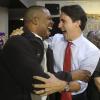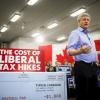
This election is going to be different, many Canadians are saying — and they might be right.
Previous efforts to abolish Canada’s “first-past-the-post” (FPTP) system never got very far, but the “Anyone but Harper” battle cry has been particularly loud this time around: The Facebook page “Anyone but Harper Conservatives in 2015” has been chiming in since before the last election. Another campaign, called VoteSwapping.ca, is encouraging voters to pair up across ridings to elect the best-chance non-Con candidate in both. An Ontario farmer even plowed the message into his field.Strategic voting campaigns, in particular, have gained momentum unlike that seen in previous elections.
FPTP — which gives a House of Commons seat to the candidate in each riding with the most votes — is “broken,” says advocacy group Leadnow, and there is a need for a committed voting bloc to prevent vote-splitting.
“In the last federal election, a majority of people voted for a change in government, but the Conservatives got 100% of the power in Parliament with just 39% of the vote,” the group says.
Leadnow aims to guide citizens to elect whichever non-Conservative candidate in their riding has the best chance of winning, regardless of party affiliation.
“This election, we can defeat the Harper Conservatives by uniting people in swing ridings where a few thousand votes will be all that’s standing in the way of another Harper majority.”
As of Tuesday, the Vote Together campaign had more than 87,000 supporters across the country who have pledged to vote strategically. Nearly 5,000 volunteers have been canvassing door-to-door and by phone for weeks, and organizers have harnessed the power of the Internet to connect like-minded voters.
“I don’t think it’s been tried like this before,” Leadnow spokeswoman Amara Possian told Yahoo Canada News. “People keep saying it’s been tried before and hasn’t worked. This campaign is different because of the information we’re providing, the volunteer resources going into it. We’re mobilizing people to talk to each other to have face-to-face conversations that can actually have an impact on election day.”
At least one expert thinks they have a shot.
“I think the conditions are, on the one hand, favourable in the sense that there are a number of ridings where a small shift in voting can make a difference in seats,” University of British Columbia political science professor Richard Johnston said.
Leadnow focused on 72 “swing” ridings the Conservatives won or lost by a small margin last election. Out of their efforts emerged 31 ridings where local polling data — which they paid for through crowdfunding — has shown a clear opposition front-runner. The group released its first 16 recommendations over the weekend.
Johnston agrees that Leadnow’s approach is novel.
“Whether there’s the possibility to engineer it is the question. In a three-way race we could be talking about quite a small difference among the parties — and the smaller the difference, the less able any survey is to detect it and identify it correctly, so there’s a problem.”
Another campaign tried to surmount that problem using more data.
Strategicvoting.ca says five million votes in 57 electoral districts were “wasted” in the last election because of the “progressive vote divide.”
“In these districts, the combined progressive vote (CPV = Liberals plus NDP plus Green) would have been greater than that of the total support for the Conservative government. Five million Canadians went to the poll and cast a ballot to make a statement and ended up changing nothing.”
For instance, the group says the NDP received a total of 4,512,411 votes but just 103 seats: 2,378,832 votes were effective, so 47 per cent of votes were “wasted.” With strategic voting the party would have won 125 seats — good enough to lead a minority government.
Using not only publicly available constituency-level opinion poll data but also 2011 election results compared against projections by website threehundredeight.com and historical voting data and trends, Strategicvoting.ca identified 128 swing ridings and made a recommendation of who to vote for in each one.
Another last-ditch effort among the Anyone but Harper crowd is taking a different angle, putting the onus on the leaders of the other three major parties to co-operate.
Recognizing that the three are more alike than not, the signatories to the Change.org petition are asking Mulcair, Trudeau and Green stop attacking one another, encourage strategic voting and, most significantly, pull their candidates from ridings where they have no chance.
“If the progressive parties cannot co-operate enough to keep Harper out of power, the three of you will be remembered for letting down the people of Canada. You will have allowed us to drift for four more years out of democracy and pluralism and into fear, surveillance, militarism, xenophobia, and austerity.”
Created on Oct 2, the petition had more than 14,000 supporters as of Tuesday morning.History says the pace of electoral reform is glacial. But even if the strategic voting campaigns don’t work, this may be the last first-past-the-post election anyway: the leaders of the other three major parties have all pledged to change FPTP should they form the next government.
Trudeau faces renewed attack in noisy start to final week of federal campaign
 By Mike Blanchfield, The Canadian Press | The Canadian Press – 18 hours ago
By Mike Blanchfield, The Canadian Press | The Canadian Press – 18 hours ago- Ontario allows self-driving cars on provincial roads for testing purposesWATERLOO, Ont. - Ontario will allow testing of self-driving cars on provincial roads starting next year, but only with a human operator who can take over in case of …
- Calgary company ready to capture carbon in Squamish 'pilot plant'A Calgary-based company is launching a ground-breaking carbon capture project to suck C02 out of the atmosphere and turn that gas into fuel. "It's pretty basic …
OTTAWA — There weren't any whistles, but there were more than a few bells, as the marathon federal election campaign entered its final week Monday.
Stephen Harper launched a game-show style attack — complete with clanging cash register — aimed directly at front runner Justin Trudeau during a campaign event in Waterloo, Ont., in an attempt to portray the Liberal leader as a threat to the pocketbooks of Canadian families.Harper was assisted by a local woman — a married mother, with two jobs — who slapped down $20 bills as he rhymed off the various tax credits for families that he said the Liberals would roll back.
The focus on Trudeau, almost to the exclusion of Tom Mulcair, came as the Liberal leader appeared to be gaining momentum in some polls, while they had the New Democrat leader tracking third.
"For some families, that could be a Liberal tax hike of up to $2,000 a year," Harper said.
"These are real benefits. Only the Conservative party in this election is committed to keeping these dollars where they belong — in the pockets of hard working Canadians."
But Trudeau fired back at the Conservative leader, saying he wouldn't be clawing back any of the boutique tax credits for families that Harper was warning about.
He said it was one more example of Harper engaging in the politics of fear and telling "untruths" to voters about his platform.
"He is desperate to try and frighten Canadians away from voting for a vision that is going to put more money in the pockets of nine out of 10 families and cut taxes for the middle class," Trudeau said.
He said the Conservatives don't have a record to run on, so they're resorting to "scare tactics and fear mongering," which includes "micro-targeting" specific communities to pit them against one another.
"We will call out fearful and divisive tactics, wherever they are used but we will stay focused on bringing Canadians together because that's the job of any leader," Trudeau told a boisterous rally in the Ottawa suburbs.
"I'm going to let my opponents continue to focus on me. I'm staying focused on Canadians."
Mulcair told his supporters in Maple Ridge, B.C. that his party was the only credible choice for beating the Conservatives on Oct. 19. But he was repeatedly forced to deflect questions about his party's slide in recent polls.
"In 2011, I saw the same pollsters say we'd be fourth in Quebec, so I don't pay attention to that," Mulcair said.
"I know the NDP is offering hope — hope to break an old habit that's been in place for 140 years. When you're fed up with the Conservatives, you're forced to go back to the Liberals."
Now, he said, the Canadians don't have to choose between one of the "old parties."
"For the first time in the history of Canada, there is a three-way race."
Mulcair repeated his assertion that the New Democrats need only 35 more seats to form government while the Liberals need more than 100.
Canadians continued to turn out in large numbers for the Thanksgiving weekend's advance polls.Elections Canada estimated that 767,000 people voted on Sunday, which was the third day of advance polls.
That brought the total for the first three days of advance polls to 2.4 million — a 16 per cent increase over the 2,077,000 votes recorded over the three days of advance polls in the 2011 federal general election.
Monday was the fourth and final day of advance polls for this election.
You Might Like »
1 - 4 of 20
- Mary Walsh resurrects Marg to bring change to Ottawa Sat, 10 Oct, 2015
- Niqab rule being considered for visitors to Parliament Hill Fri, 9 Oct, 2015
- 8 candidates get the pawprint stamp of approval Fri, 9 Oct, 2015
1 - 4 of 20
1 - 4 of 12















No comments:
Post a Comment